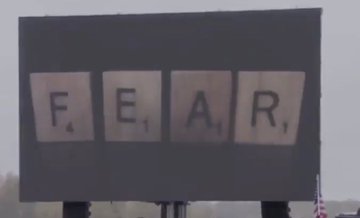by Greg Evan

Picture: Chip Somodevilla/Getty Images
A video that that was played to Trump supporters at a rally in Michigan on Tuesday has shocked people who have seen it to such an extent that it's being compared it to the totalitarian government in George Orwell's 1984.
The clip was played to Trump fans at the Capitol Region International Airport in Lansing prior to the president's arrival and featured an ominous voiceover from Trump, menacing imagery of America, the president and for some reason the European parliament.
It also contained a remix of the Linkin Park song In The End, a band that has previously sued the Trump administration for using their music without permission.
A recording of the video was captured by Forbes reporter Andrew Solender and has now been viewed more than 1 million times on Twitter.
It's not clear who made this video or if it has been played at other Trump rallies during the election campaign but many have compared it to dystopian novels like 1984, The Hunger Games, Star Wars, North Korea and Nazi propaganda.
Others were shocked to hear Linkin Park's music used in such a way however, the band doesn't appear to have offered a statement in regards to its use at the time of writing.
Also, why was the EU parliament in there?
Trump has been holding campaign rallies across the United States on daily basis for the last few days in an attempt to whip up support for himself at the polls. Many major polls still place the president behind Joe Biden in the running for the White House, with the Democrat leading by double digits in some key swing states.
Replying to @AndrewSolender
I have... so many questions.
The easily recognizable symbol of global oppression that is the EU parliament chamber
Replying to @AndrewSolender
Never thought I'd see the day that fascist propaganda would be set to Lincoln Park, yet here we are.










